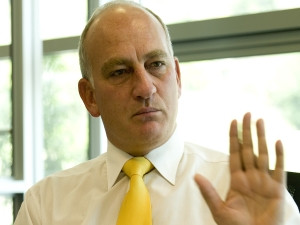
Local mobile operators are precariously close to using up allotments of available spectrum, and at least one is pondering hiking prices in the next 18 months in an attempt to limit use, as network quality will become degraded.
Operators have been waiting some time for the Department of Communications to free up more space in the 2.6GHz range, which is in demand for long-term evolution (LTE). While a policy direction was last year set to be issued "soon", this has yet to happen.
In addition, cellphone companies want access to the so-called digital dividend, which will see space in 800MHz freed up once SA moves to digital television. This range is considered a cost-effective way of expanding broadband in more rural areas, as its wider reach requires less investment in base stations.
However, SA has put allocations in that range on hold until after it has migrated off analogue television, which is now set to happen around the middle of 2016 after several delays.
Data surge
MTN CEO and president Sifiso Dabengwa says spectrum allocation, especially in SA, is vital and the company had hoped the process would have been clarified by now.
MTN SA MD Karen Pienaar says there is an 18-month window, which could run out sooner, before capacity will become so constrained that quality will drop and the operator will have no choice but to limit use by pushing up the price.
The "wild horse" is the growth in use of data on networks, says Pienaar, adding that the competitive environment has also led to increased network use. He adds that the effective cost of both voice and data declined substantially last year.
In the year to December, MTN SA saw total minutes on the network increase 11.5%, and data traffic gained 170.6%, to 14 342TB. Data now accounts for a quarter of revenue from the local unit.
Complications
Cellphone networks were already taking strain before operators started rolling out LTE. Operators have been re-farming spectrum as a stopgap in a bid to launch LTE until more suitable spectrum becomes available.
MTN is converting sites to LTE, with almost 300 switched on already and plans to turn on around 1 000 sites each year, depending on uptake and devices, says Pienaar.
Pienaar adds that the current price war in the sector is getting a "little bit dangerous", as it could undermine the business case for investment. He says, at the moment, MTN has capacity, but there is a "train smash" coming a year-and-a-half down the line.
In 2013, MTN SA is pumping R5.7 billion "into the ground"; its single largest investment in any one year after stripping out capitalisation of leases from last year's R6.4 billion, says Pienaar. "This is another year where we take all our profit and put it back in the ground."
MTN added 300 2G and 1 087 3G sites last year, and completed 1 300 fibre-to-the-site installations and has 8 815km of fibre in operation.
Crunch point
Vodacom spokesman Richard Boorman says, "given the huge growth in data usage in SA, we are approaching a crunch point when it comes to access to sufficient spectrum".
The network, SA's largest, reported in November that locally data revenue grew 13.5% year-on-year and the group saw a 42.5% growth in data traffic. It now has 13.3 million active data customers, a 21.9% gain year-on-year.
Data is core to Vodacom's future growth strategy, CEO Shameel Joosub has said. He added that the company now has 6 201 3G base stations, a 25% year-on-year improvement, and has self-provided at 5 077 sites in SA, some 55% of all towers, with plans to build another 1 000 3G towers this year.
In the first half of the year, the group invested R3.7 billion in its local network and aimed to spend a similar amount in the second half, which is drawing to a close.
Tricky place
Dobek Pater, analyst at Africa Analysis, says the current move by operators to re-farm spectrum for LTE does lead to deterioration in the quality of networks. He says there is a limit to how fast LTE can be rolled out considering current spectrum constraints.
Pater adds that it is a tricky situation, because if MTN increases prices it may find itself becoming uncompetitive in the market. In addition, data will continue to grow and is a key future revenue driver.
It is likely that operators will put more pressure on government to address the lack of LTE spectrum, says Pater. He says operators are currently stuck in limbo.
Independent Communications Authority of SA spokesman Paseka Maleka has said it has been ready to award spectrum licences for over a year now, and "we are still awaiting policy directives to proceed with the licensing on the 2.6GHz band".
"The operators are also encouraged to efficiently utilise their licensed spectrum and invest more on rolling out network services in terms of their licence conditions."
Share